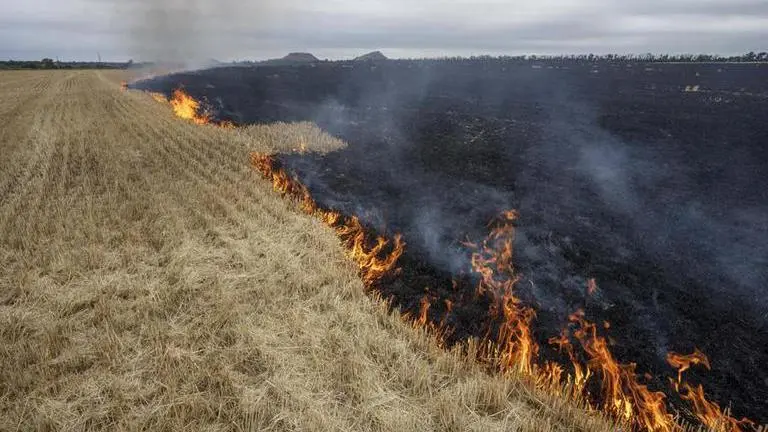Updated 30 July 2022 at 08:58 IST
Moscow-Kyiv war: Wheat fields near Ukraine frontlines burn after shelling
Wheat fields near Ukraine frontlines burn after shelling
- World News
- 3 min read

Amid the harvest in Ukraine, many fields near the frontlines burn.
In the Kharkiv region, an Ukrainian serviceman going by the name of Kurt, told the Associated Press that the fires burning in the wheat filed he had been working on were caused by Russian shelling.
"Russia and Russian forces are to blame for the food crisis. They destroy our warehouses, our crops, our fields, our food, our animals. They destroy everything. Everything we've planted with our hands, they destroyed," he said.
Ukrainian President Volodymyr Zelenskyy visited a Black Sea port Friday as crews prepared terminals to export grain trapped by Russia's five-month-old war.
Advertisement
Work followed a deal reached a week ago to allow critical food supplies to flow to millions of impoverished people facing hunger worldwide.
The first ship to leave the Chernomorsk port in the Odesa region is a Turkish vessel.
Advertisement
Zelenskyy said, however, that the departure of wheat and other grain will begin with several ships that were already loaded but could not leave Ukrainian ports after Russia invaded in late February.
Ukraine is a key global exporter of wheat, barley, corn and sunflower oil, and the loss of those supplies has raised global food prices, threatened political instability and helped push more people into poverty and hunger in already vulnerable countries.
The Ukrainian president's unannounced visit to the port is part of a broader push by Ukraine to show the world that it is nearly ready to export millions of tons of grains after last week's breakthrough agreements, which were brokered by Turkey and the United Nations and signed separately by Ukraine and Russia.
The sides agreed to facilitate the shipment of wheat and other grains from three Ukrainian ports through safe corridors on the Black Sea, as well as fertilizer and food from Russia.
But a Russian missile strike on Odesa, hours after signing the deal, has thrown Moscow's commitment into question and raised new concerns about the safety of shipping crews, who also have to navigate waters strewn with explosive mines.
The security concerns and complexities of the agreements have set off a slow, cautious start, with no grains having yet left Ukrainian ports.
The sides are facing a ticking clock — the deal is only good for 120 days.
The goal over the next four months is to get some 20 million tons of grain out of three Ukrainian sea ports blocked since the Feb. 24 invasion.
That provides time for about four to five large bulk carriers per day to transport grain from the ports to millions of people in Africa, the Middle East and Asia, who are already facing food shortages and, in some cases, famine.
Published By : Associated Press Television News
Published On: 30 July 2022 at 08:57 IST
